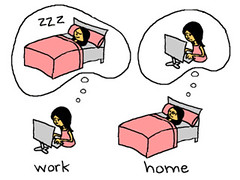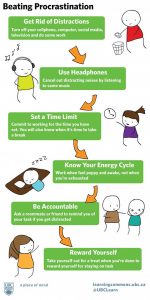25 Work Life Balance
Zac Wilson; Kaitlyn Martinez; Alanna Goldman; and Kyle Ekbom
Work-Life Balance

More than 40 percent of college students experience above-average levels of stress, according to the National College Health Assessment. As students, we have plenty of aspects of our lives that add to our stress. The purpose of this section will be to focus on how our work-life balance affects our stress levels and overall health.
Time Management
Time management is the ability to plan and keep track of the day, as well as how someone productively spends their day. Time management, boundary setting, and priority adjustment is an essential tool in maintaining a work-life balance. Taking on the responsibility of a full-time student or a full-time employee (or both) can make it hard to maintain work and personal life all while trying to complete important tasks. One crucial factor of maintaining good time management is to ensure efficiency with all time, whether it be personal and for work. It is important to make certain you do not procrastinate, as well as not overwork yourself. A useful trick to aid in procrastination habits is to divide tasks into smaller parts. The simple act of dividing out necessary work will provide peace of mind for the insurmountable stress caused by life. Procrastination can get incredibly stressful when work starts piling up more and more, which is why dividing work into sections is very helpful. You could even reward yourself after each task is done to keep you motivated.

Before developing a time management strategy it is crucial to analyze how you are spending the day. It is important to have a workspace that emphasizes a successful workday and a place that is quiet and distractions are eliminated. Time management helps individuals have more of a work-life balance because with these tools, having a personal life will not be an issue. It is beneficial to establish short term as well as long term goals for your days and prioritize what needs to get done. Leave non-essential tasks to the side so they are not distracting and do not take away from time you could be working on an important task. One method for better time management is the ABC prioritization method. If any work lands on the A list it is the most important, B is the second most important, and finally, C is the least important. Some of the most important time management skills are the following: Organization, prioritization, goal setting, communication, planning, delegation, and stress management. All of those skills are necessary to help individuals stay on track and manage their time better. Planning out the day can be useful to keep the day organized so that you know what is happening throughout the day and when work needs to be done. Another option is to create a calendar or planner or carry around a notebook with you. These two skills can be very beneficial to students and workers. Carrying around a planner or notebook with your tasks as well as listing tasks throughout the day as they come to mind can be very helpful. It is also suggested that you set realistic deadlines. With these deadlines, you are given a specific day and time that something needs to be done, which makes it harder to stay off task and procrastinate. All in all, time management is key to a successful work-life balance and will help you to finish tasks and prioritize them.
Health
Our health is vital when it comes to maintaining a healthy work-life balance. This includes our mental health, for example, mental disorders such as anxiety and depression, and our physical health, but if we do not take care of our soul and mind with the proper nutrients and fuel that we need, then one’s well-being could be in danger. The importance of a healthy lifestyle can go a long way if taken seriously. If we as a society took time out of the day to pay attention to these red flags, then we can dedicate ourselves to spending more time on our wholeness.
First and foremost, is our mental health. As I mentioned in the first paragraph, there are two main mental health disorders known as Anxiety and Depression. These two mental health disorders are very common in the workplace. Anxiety is characterized by feelings of worry, anxiety, or fear about an uncertain outcome, and is accompanied by depression which causes feelings of sadness and loss of interest. Both of these disorders can harmfully impact the way we work. Certain conditions at a workplace can affect an individual causing stress which could eventually lead to a mental health disorder. As a current college student, managing work, school, social life, and family is a challenge. It is important to build our mental stability and one way by doing this is by using a mental health journal to help express your current feelings and emotions. Writing can help us gain control of our emotions and a sense of relief. According to the University of Rochester Medical Center, “Journaling helps control your symptoms and improve your mood by helping you prioritize problems, fears, and concerns, tracking any symptoms day-to-day so that you can recognize triggers and learn ways to better control them and providing an opportunity for positive self-talk and identifying negative thoughts and behaviors.” Take this as a step by step process and evaluate how you felt that specific day, how you can improve, what went well, and what triggered the anxiety or depression. By writing down our thoughts we are more likely to understand them more clearly.
Just as our mental health is significant, our mind and bodywork together, if one does not properly function then the other cannot work as well. A healthy lifestyle consists: working out every day for at least 30 minutes, eating proper nutrients such as fruits and vegetables, and getting sleep. However, each individual may differ from their sleep schedule. It is important that we are aware of the signs our body may be telling us. When you are experiencing poor mental and emotional health, your immune system weakens. When you are stressed, anxious, or overwhelmed, your body reacts. It is important that we complete some sort of exercise, whether that be going on a walk, running, swimming, and dancing. Physical health has two components: Nutrition and Exercise. As previously mentioned before, nutrition is what you put into your body. What you eat affects your appearance and overall how you feel on the inside. If you consume your fruits, vegetables, carbohydrates, and protein then you are more likely to feel better on the inside and outside. Exercise is to improve your muscle strength and boost your endurance. When you exercise you produce endorphins, which interact with the receptors in your brain that reduce pain. Following along with exercise, one great practice for the mind and soul is Mediation. If you go to a quiet room and sit down and close your eyes and imagine you are on the beach or a peaceful setting of your choice and take deep breaths. This is not going to solve your problems, but it is used as a sense of relief and relaxation. By incorporating exercise and proper nutrition you will experience a healthier lifestyle.
With physical and mental health being significant in a work-life balance, stress is a major contributor. What exactly is stress? Stress is a physical, mental, and or emotional factor that causes mental tension. Even though stress is known as a bad thing, it actually can help motivate us. Hans Selye is known for his studies of the effects of stress on the human body. He stated that there is a good

form of stress known as eustress, which is a good type of stress that can benefit one in challenging situations. However, with the good form of stress known as eustress, there are negative effects of stress on the body. No need to panic because there are ways that we can manage our stress and keep it under control. First, is taking a walk or some sort of exercise, when we workout it pumps up our endorphins. Secondly, mediation and or breathing exercises, when we can sit down and unwind we are practicing meditation. Breathing exercises are helpful when we are in stressful situations, for example, inhaling and exhaling. Thirdly, journaling helps clear your mind. If you aren’t one who likes to write your feelings down, draw them instead. Use your images as your voice. Lastly, using a planner can help you stay organized and on track.
Work Environment
The attitude that we have towards our daily activities can make all the difference between having fun and being stressed. The Intro To Psychology textbook offers insight into our attitudes and how we control them. In essence, it says that how we feel about a situation is up to us. If you are unhappy with a certain aspect of your life then try this exercise. Close your eyes. Take a few deep breaths and forget about the negative thoughts that you may have. Now do your best to think positively and picture yourself in a positive environment. Try to trick yourself into believing that you love work; you love school; you love homework; etc. This is a proven exercise used by psychologists to help motivate different cultural groups. You can try this exercise each time you feel lethargic or negative towards your work-life balance.
A positive attitude is not the only thing that affects your work life. The people around you make a large difference in how productive you are as well. Studies show that a positive work environment increases productivity by up to 43% and provides employees with a healthier mentality than those who work in a negative environment. Office cleanliness affects the overall positive vibes of your work as well.  While it is commendable to work while going to school, keep in mind that it may start to weigh on you. Pick a job that makes you feel fulfilled and satisfied at the end of the day. Not only will it make your day go by faster but it will also help you in every other aspect of your life! It can assist you in your studies. Positivity can help you put a smile on other’s faces! Ultimately, working in a healthy, positive work environment will alter your life considerably.
While it is commendable to work while going to school, keep in mind that it may start to weigh on you. Pick a job that makes you feel fulfilled and satisfied at the end of the day. Not only will it make your day go by faster but it will also help you in every other aspect of your life! It can assist you in your studies. Positivity can help you put a smile on other’s faces! Ultimately, working in a healthy, positive work environment will alter your life considerably.
As students, we tend to “burn-out” when we take on too many tasks. We forget to breathe, to relax, to focus on the important things. Unhealthy work environments, poor schedules, and bad attitudes make college life miserable and expedite the “burn-out” process. Find an awesome job and prioritize your life! You can do this!
Sleep
The correct amount of sleep is essential to maintain a healthy work-life balance. Without the correct amount of sleep, one may not be able to function properly throughout the day and within the work environment. Not getting enough sleep can lead to many problems with one’s health, such as disorders(Insomnia and Sleep Apnea) and fatigue that restricts one’s mind and body from functioning at its full potential. Fatigue can affect behavior, interactions, and can even have physical effects. If you are fatigued then you are most likely to be moody, mumble when you speak and get triggered, and potentially snap at people very easily. Not only does your behavior change, but also eye bags form on your face and it may be a struggle to keep yourself awake for class or work, which can be very dangerous. You may ask how do I get the correct amount of sleep? Well, it’s actually a very simple solution, different ages require a disparate amount of sleep, and many factors before one goes to bed can potentially harm or better the amount of sleep one receives.
Many of you most likely go on your phones before you fall asleep. This is actually detrimental to the amount of sleep you receive, not only does being on your phone keep you up longer than you anticipated, but it also restrains the production of melatonin (a hormone that controls one’s sleep-wake cycle) which makes it more difficult to fall asleep and wake up the next morning. This is just one of the many factors that harm sleep patterns and motivation in the morning. There are many things one can do that helps one’s sleep cycle and prevent a loss of sleep. Some examples are to set up a fixed bedtime and wake time in order to ensure that you do not oversleep or get up too early, you can also develop a nighttime routine, avoid electronics and make sure your bed is comfy and the room is dark. These are just some of the many examples that control sleep and make sure you get a good night’s rest without overdoing it. Sleep is not something to overlook, make sure you are getting the correct amount of sleep to ensure that you and your mind are working to its full potential during work, school, and around your family.
Conclusion
In conclusion, mental health and physical health are significant while sustaining a healthy work-life balance. This is the importance of why we as individuals should take the time and day to focus on ourselves to take care of what is truly valuable. Practice incorporating the helpful tips that were listed above to manage your stress. Consisting of a healthy lifestyle that meets your needs will be beneficial to you, your mind, and your soul. If you practice managing your time, you will create a positive work environment and balance.
Community Resources
- PVCC academic coaching and tutoring: Call 602-787-7180 to get help with any work-life balance needs whether it is time management, or how to better your stress. They have many different types of coaches that can help with any of your needs. You can choose from a reading coach, a success coach, and tutoring.
- PVCC’s Learning Success Center: You can reach them at 602-787-7180 and they will help you find any tutor or coach and make appointments with a professional.
- Life Coach: A life coach can be very beneficial in helping with a work-life balance. There are plenty of life coaches that do online virtual sessions that are convenient for you. At bark.com they will help you pick out all your needs from what kind of coach you want, and whether you prefer male or female and it searches for professionals in your area.
Media Attributions
- Work-Life Conversion
- Beating Procrastination
- anxiety
- Dirty office
- Tired but can’t sleep

